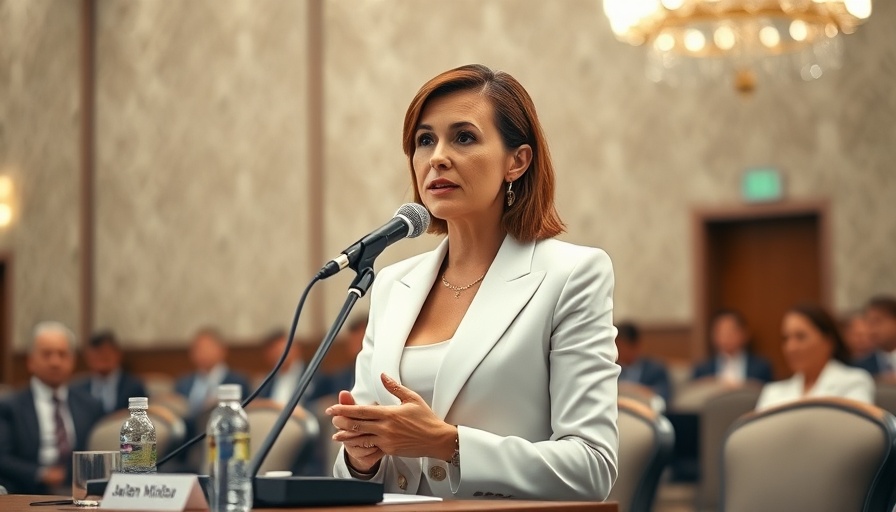
Updating Online Safety Laws: A Crucial Step for Our Youth
In a digital age where children often have unprecedented access to social media, U.S. Senator Katie Britt (R-Montgomery) has taken significant steps to enhance federal laws on online safety and data protection. Recognizing the alarming rise in mental health issues among youth, Britt's recently introduced legislation aims to update existing regulations that protect children and teens from excessive data tracking and targeted advertisements.
Britt clarified the urgency of these changes during her Senate press conference, stating, "Keeping American families safe includes keeping our kids safe on the internet. Our country is in the throes of a mental health crisis, and the rise of social media usage among children and teenagers is inextricably tied to this problem." Her sentiments resonate with many parents who are increasingly concerned about how their children's online interactions affect their mental health.
Understanding the Legislation: COPPA 2.0
The latest initiative, the Children and Teens’ Online Privacy Protection Act, also known as COPPA 2.0, is designed to fill the gaps left by outdated laws. The original Children's Online Privacy Protection Act was passed back in 1998, long before the era of smartphones and apps that dominate children's lives today. COPPA 2.0 not only strengthens data privacy rules but also aims to ban targeted advertising directed at children and teens.
Key provisions include establishing stringent data minimization rules to prevent excessive data collection and closing existing loopholes that allow platforms to neglect the presence of young users. One innovative feature of the legislation is the "Eraser Button," requiring companies to enable users—especially minors—to delete any collected personal information easily.
The Connection Between Online Activity and Mental Health
Numerous studies have indicated a strong link between social media use and deteriorating mental health in adolescents. Experts like Senator Edward Markey (D-Mass.) reaffirm this connection, emphasizing that online platforms are essential in addressing these issues. Markey stated, “Big Tech is knowingly fueling a mental health crisis in this country by exploiting kids and teens just so they can make more money.”
Such assertions underline the pressing need for legislative action. Social media's intricate algorithms often prioritize profit over the well-being of young users, prompting calls from various factions, including parents and educators, to demand protective safeguards.
Engaging Parents: A Collective Responsibility
For parents of today, navigating the digital landscape is more complex than ever. Senator Britt’s advocacy signifies a vital step in understanding parental concerns about children’s digital footprints. With alarming statistics pointing to rising anxiety, depression, and behavioral issues linked to digital interactions, the legislation offers a glimmer of hope.
As Britt notes, “Parents should be confident that their children can use the internet safely.” This assurance can empower parents to foster healthy online habits and establish meaningful conversations about internet usage within the family.
Future Predictions: What Lies Ahead for Online Privacy?
The implementation of COPPA 2.0 could serve as a benchmark for future reforms in a rapidly evolving digital world. If successful, it may inspire further legislative measures aimed at safeguarding online environments for other vulnerable populations. Moreover, public discourse surrounding kids and digital health continues to blossom, encouraging debates about ethics in tech companies and user rights.
Furthermore, as the landscape of online interactions changes, there is a growing expectation for more transparency from tech giants about their data practices. Both the public and lawmakers are demanding the enforcement of stricter regulations that prioritize users' privacy and mental health.
Making Informed Decisions: What Parents Can Do
The introduction of COPPA 2.0 is not just about legislation; it's about empowering parents to take charge of their children's online safety. Simple actions, such as educating kids about online privacy risks and monitoring their online activities, can significantly enhance safety measures within the home.
Additionally, engaging in open dialogue regarding internet usage helps create a sense of awareness and responsibility among children, fostering a culture of safety and mindfulness as they navigate online spaces.
Take Action: Advocating for Online Safety
As the legislative process unfolds, parents can play a crucial role in advocating for better online safety measures. Connecting with local representatives, staying informed about bills like COPPA 2.0, and joining community efforts directed at raising awareness about online risks can help fortify calls for change.
By embracing the shared responsibility of ensuring safe online environments, families can contribute to a broader movement that prioritizes children's mental health and well-being in this digital age.
 Add Row
Add Row  Add
Add 




 Add Row
Add Row  Add
Add 

Write A Comment